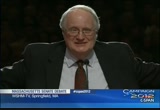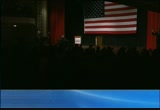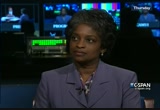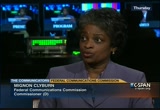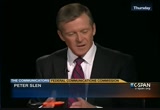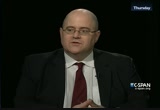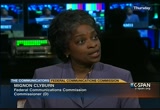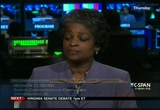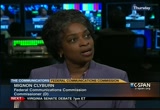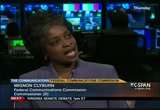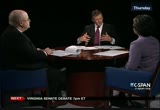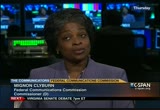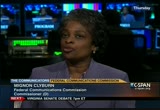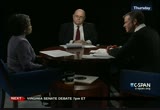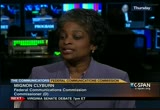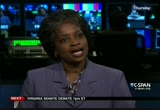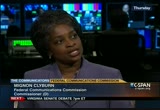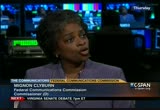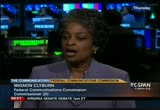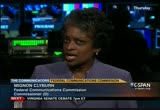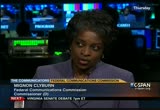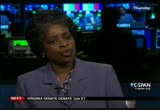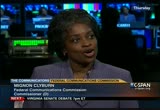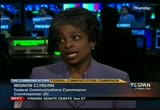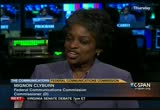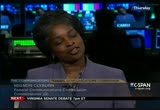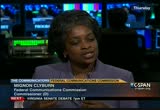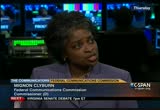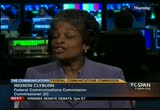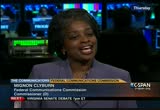tv The Communicators CSPAN November 3, 2012 6:30pm-7:00pm EDT
6:30 pm
please. i have about 15 seconds to say thank you for the springfield public forum, all of the members for making this possible, a great big thanks to a senator scott brown and to elizabeth warren for coming and spending time with us. it does not matter what you did tonight if you do not get out and vote november 6. thank you for watching. [captioning performed by national captioning institute] [captions copyright national cable satellite corp. 2012]
6:31 pm
>> our live road to the white house coverage continues tonight. first, at a 20 5:00 p.m. eastern, republican candidate mitt romney and his -- at 8:25 p.m. eastern, a republican candidate mitt romney and his wife at a rally. then, at 10:35 p.m. eastern, obama and bill clinton attend a rally. >> now joining us on the communicators this weekend before the election is fcc commissioner mimi on cyberporn mignon cyburn. if we could start with the events of the week.
6:32 pm
cellphone towers have been knocked out. people are using pay phones because their service is not working. what is your assessment of the carriers and their ability to maintain phone service for people in the area? >> first of a, allow me to thank you for allowing me to be here today. my condolences go out to the families. many of loved ones were lost in this tragic event. my condolences go out to them and my hat's off to those brave who continueders troop answering the call. in terms of the fcc engagement, the chairman literally spent the night at the agency. our public relations person did the same. we are engaged in the process and have been working with fema to make an overall assessment. you are right with those initial
6:33 pm
numbers. up to 25% of the cell phone towers have been disabled. what the fcc does and continues to do is to work with these entities to assess the situation on the ground and to use this information to see what we can do better going forward. we have not talked about payphones in a long time. that just reinforces that in terms of communication engagement, it is then all of the above approach. very few things are too legacy to use and very few things are not vulnerable. we are engaged to be sure that whatever the best lessons and best practices are going forward, in terms of redundancy in the light, but we will do better next time.
6:34 pm
>> is this an improvement over the last natural disaster we suffered, looking back to 2005 and katrina and some other hurricanes? >> it is too early to make that assessment even now. it is never satisfactory for those out of service. we are going to have vulnerabilities. when you have power, when you have and the structure, they are going to be vulnerable to natural disasters, of course. but i think all in all, in terms of the response, what i am hearing, what i am sensing is that people see that deployment was made to do so and a lot of circumstances -- a lot of systems worked as well as they could under the circumstances. i think you will see improvements in terms of the result of the end of the day. >> joining us is paul kirby, a
6:35 pm
senior editor with telecommunications report. >> one of the issues that is, this week is about the powers. a few years ago, the sec adopted rules the were challenged in the court. the real art -- fcc adopted rules the were challenged in the court. two judges were skeptical and so the fcc abandon them. >> this situation, while tragic, really highlights why we do some of the things we do. yes, a backup power systems devin ilie were strained and in play -- definitely were strained and in play here. they're not going to last forever, as you mentioned. some people talk about jurisdiction.
6:36 pm
those lines are being constantly bullard. i am hoping that even though this was a it -- being constantly blurred. i am hoping to that even though this was a tragic engagement, it will influence positively the type of reinforcement structure we need to be more resilient in these times. >> you would support a mandate? >> what i support a mandate? >> yes. >> i would say that i would review and -- it should not surprise you that i would not make a pronouncement here, but i am supportive of any type of reinforced -- any type of policies that will ensure not only an ongoing, positive, robust engagement during normal times, but the ability to read about and reinforce during times
6:37 pm
like these. >> as peter said, we are almost on an election year. some folks think if mitt romney were to win, the sec and justice department might run different -- sec and justice department might decide differently with regards to some mergers and acquisitions. quebec concerning -- would that concern you, if there were more consolidation in the wireless industry, for example? >> the way in which we evaluate mergers, the way in which we digest information, the way in which staff processes information, that part will not change. as you mentioned, whoever is named head of the department of justice, whoever i their remains
6:38 pm
or is named head of the -- i their remains or is named head of the -- either remains or is named head of the fcc will take on some of the characteristics of the presidency. but in terms of the way we govern ourselves and the way we that willformations, never change. i am always mindful of a more consolidated eco system, with the means, what that means in terms of its independent voices, in terms of diversity, in terms of small communities. it really came home for me when i saw an newscast where an individual -- i will say that
6:39 pm
english was not his first language. he did not know the system was going to shut down its 7:00. how is he supposed to receive that information? as an individual, a more robust, the first media infrastructure -- it increases for dissemination and the like. chances are, he is going to go to that information source. chances are, that information source would have disseminated the affirmation. this individual was stuck because the information did not get to him. i am concerned abut a consolidated ecosystem looks
6:40 pm
like. i am always committed to engagement. >> what about the first responders? what did you see, what have you assessed so far when it comes to first responders and hurricanes sandy and their ability to communicate? >> a couple of things about new york. new york has a system called plan. i am horrible with acronyms but i think it is personal -- i cannot remember what the acronym is but it is a personalized alerts. the a stands for alert. what i saw from that standpoint was that the individuals who had enabled the phones found out what was going on. that was an augmented help to first responders. we worked with fema and other entities to ensure the systems' and back of systems were in place. we worked with radio stations to
6:41 pm
ensure they have backup power in terms of generators. what i am seeing is, again, how codependent we are and how much i communications back up, that infrastructure, how much that means, especially in times of crisis. the fcc was all hands on, open 24/7 to ensure that wherever there were deficiencies, there.ere >> you have been nominated for a second term by a pope, but not confirmed by the senate. >> this is true -- by barack obama, but not confirmed by the senate. >> this is true. >> there are rumors you would be designated as acting chairman. >> i have not heard that.
6:42 pm
i would be honored to serve. i will continue to serve if confirmed and i will continue to serve in any way the president and the senate deems fit. >> if the senate does confirm you, what are some of the issues you want to focus on in a second term? either in the majority or the minority. >> a lot of things, as you know, are in place right now. we are very busy in terms of the authority we were granted in february. this is the first of its kind in the world. we have an incredible opportunity to make more efficient both the broadcast space and the mobile space. in terms ada, ensuring those with disabilities have as many
6:43 pm
opportunities as they can in the communication space, by way of ys of engagement, by waistcoa audio engagement. universal system reform and labat means, those things -- and what that means, those things are back in march 2013. we of 90 million individuals in this nation who, -- we have 19 million individuals in this nation who, regardless of their means, do not have infrastructure to have access to engagement. that is very important to me.
6:44 pm
in terms of education, in terms of providing robust health care to some of these areas where they may not have specialized care, this is so important because to me, broadband connectivity is a panacea for so many issues we had in this nation. broadband, broadband, broadband, we cannot talk about it enough in terms of connectivity. >> you made a speech in which you talked about broadband 11 times. >> you were counting. >> are you concerned that if enough broadcasters do not agree to give their spectrum but there will not be enough and wireless carriers will go to congress and
6:45 pm
say this should be mandatory, not voluntary? are you concerned about that? >> i am not. we have no plan be. there is a plan a. o are doing all we can tupa ensure that there are market opportunities for both buyers and sellers can take advantage of. this is an incredible, unique opportunity for both broadcasters and those in the mobile industry that i think increasingly -- and i cannot say voluntary enough, because it is a robust and engaged process. it has the opportunity to bring more spectrum into play than we have seen in 25 years.
6:46 pm
i am not concerned. we are doing all the weekend to make it all that it can be and i am not going to be speculative as to how much it will bring to market, but it has the potential to really put us on a very firm pathway of meeting the needs of this nation by way of mobile engagement. >> you did say there is a good interest at least from broadcasters so far. what are you basing that on? >> i am basing that on the engagement and the questions that are being asked. i am basing that on the 20 engagements we have had by way ebinars.b there was engagement there. when you hear concerns being voiced -- change is difficult. when you hear concerns being voiced, that does not mean a- engagement. that is a group of individuals who are concerned about the way
6:47 pm
things are progressing. what we are doing at the fcc is having an open and transparent engagement to be sure that as many questions as we can answer are being addressed in order for this to be a success. >> is the process moving quickly enough, in your view? >> absolutely. we were just granted authority in february. in april, we laid out a framework as to who would be eligible. in september, we just released notes for rule making a will consider all the technical aspects. this is a really robust and highly technical framework. again, this is a first in the world type of engagement. it is going to be very dynamic aspects it leads us to 2014. i am confident we have the
6:48 pm
resources. i am confident that the internal team we have is doing everything it can to ensure that there is an open, robust engagement, that this is a successful engagement, and that we will move more spectrum to market. >> when we talked with some of your colleagues, they both mentioned that the government has a lot of the spectrum the dizzying pace news and talk about more share -- spectrum that is being unused and talk about more sharing. can you talk above that? >> this is an all of the above type strategy.
6:49 pm
i mentioned 2014 for a reason. it is going to take awhile for us to put everything in place. in the meantime, what do we do? every other person we know has a tablet. most people we now have smartphones. that uses more energy than our old way of communicating. i should not say old. the legacy way of communicating. a lot of the still have landlines. we have to look the best means and the best way and the timetables in terms of deployment of getting that spectrum to market. spectrum sharing, looking at what the federal -- within the
6:50 pm
federal coffers, so to speak, in terms of spectrum. all of it is in play. it is and all of the above strategy to get this to market. dynamic spectral small sales, you hear a lot about that. all of these, we are looking at how we can be more efficient and getting spectrum to market both long-term and short-term. >> in the summer, there was a report that said that sharing federal government agencies should be the norm. the administration to get those agencies to identify 1,000 megahertz of spectrum to share. wireless carriers say hold it. first we should be a signing spectrum for exclusive use, not
6:51 pm
sharing. what would you say to them? >> i would say again that everything needs to be on the table. there should be a rigid -- not be a rigid timetable in terms of whether this should go first or there should be sharing first. we want to address critical needs going forward. i do not necessarily want to go against one party or another, but it is difficult for me, and i think it should be difficult for others, to be rigid in this process. we need to, again, look at all avenues as it relates to getting to the much-needed, much demanded spectrum to market. that includes refurbishing. that includes reallocating. that includes all of it. in order for us to have a steady stream or steady pathway, a
6:52 pm
steady means to get spectrum to market, that is what we need. >> what have you learned? what do you take away? >> that we have more in common than not. no matter what commissioner you speak to around the world, from the smallest of nations to the most developed and robust of nations, you have everybody sang the same thing -- saying the same thing. they want affordable, ubiquitous broadband for their nation because they know what it means in terms of economic development. they know it means in terms of information exchange. they know what it means. we have more in common than that. you have read about some controversy, especially as it relates to leading up to what or lookingthe ipr's
6:53 pm
at the rules and regulations regarding the international telecommunications union. there are always going to be some enhanced, robust, and sometimes intense conversations on the international level. but again, if you speak to the majority of the 190 plus nations, they want their countries to be the best they can be. they want their people to be the best they can be. and they see what we do, that a broad band enabled infrastructure will leapfrog like cellular has done in many developing nations, a leap frog them from where they are now to where they can be. again, there is a lot of sharing of best practices, sharing of best ideas, sharing of
6:54 pm
resources. there is more going on by ways of sharing and negotiations than sometimes the headlines revealed. that is what i see. those commonalities outweighed those key the relatively few frictions you might see or hear about. >> going back to competition in the wireless market, a couple of things could potentially be in the balance going into the election. special access rules allow enterprises and others to get access to facilities. the other could be internet rules which are currently under challenge. if romney were to win, if a republican-led fcc were to not want changes to the access rules, how do you think that would impact competition in the
6:55 pm
private market? >> i think sometimes we use freezes for granted that we think everybody knows. it freezes for granted that we think everybody knows. what -- phrases for granted that we think everybody knows. when you lead to the atm and take your time because you have more money, that is special access. when that atm communicates with your bank to allow you to withdraw what you want, that a special access. to me, you see as looking at how competitive the market is. to me, what that means and what that tells in terms of the future of the particular
6:56 pm
proceeding is very telling. again, we're talking about some basic essential services, from your atm to using your card to go to the gas pump. how are the rates and conditions there? those are the types of questions that i trust will be answered regardless of the political makeup of the fcc. i feel that there is a need for more data and a need to have more evaluation as it relates to that. in terms of access, there are some key essential services that could be potentially affected if all of those variables are not considered before a final decision. >> might the conclusions be different if there were three republicans and two democrats? >> i can only put forth to you
6:57 pm
the inputs and variables this commissioner will use to make her decision. >> the open internet rules under challenge. those of in from now -- those have been thrown out by the court. >> in terms of -- i remain very helpful in terms of the courts engagement as it relates to this. we put forth six high-level rules that fit on one sheet of paper that clearly defined for both user as well as the companies providing the service that this is the type of the engagement we should have for a robust infrastructure for a robust exchange. there should be transparency. you should know what you are getting by way of service. if i have a device, that i can use my own device if it is not
6:58 pm
harmful to the market. if i am trying to access information that is legal, i can do that. that there is a nondiscriminatory pathway as it relates to this engagement. yes, there are reasonable network management principles, but that as transparent too. what i think and what i know is that we use these terms like open internet and net neutrality to get people upset, but what it is our clear rules of the road that are put forth for engagement. there have been no official filings. i do not always affirmed that this is not an inexpensive space to navigate. in terms of officially filing something, that is an economic
6:59 pm
threshold of a lot of people do not have the time or the capacity or the economic means to me. we do here -- i hear every day about challenges. whether or not those individuals have the wherewithal, have the means to come and file a formal complaint -- as a commissioner, as a regulator, as a public servant, it is up to me to take all of those things into consideration as i make policy. in terms of our open internet engagement, that is why i have embraced it. that is why i affirm that in principle that it worked when it was a more informal framework and it will continue to work under the current framework because clear rules of the road are open and are there for us to take advantage o
158 Views
IN COLLECTIONS
CSPAN Television Archive
Television Archive  Television Archive News Search Service
Television Archive News Search Service 
Uploaded by TV Archive on

 Live Music Archive
Live Music Archive Librivox Free Audio
Librivox Free Audio Metropolitan Museum
Metropolitan Museum Cleveland Museum of Art
Cleveland Museum of Art Internet Arcade
Internet Arcade Console Living Room
Console Living Room Books to Borrow
Books to Borrow Open Library
Open Library TV News
TV News Understanding 9/11
Understanding 9/11